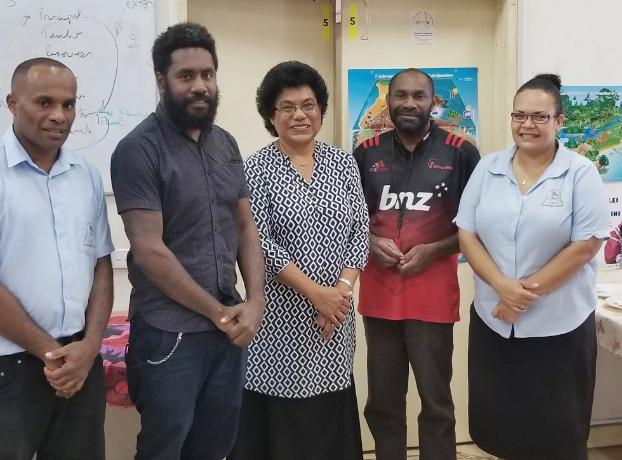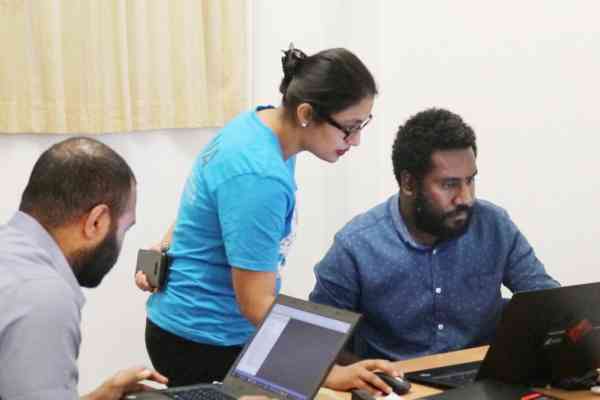From left: MOET’s senior assessment officer Henry Jimmy, IT Manager Adrian Banga, EQAP’s Curriculum and Assessment Team Leader Mere Vadei, senior curriculum coordinator Tamata Frederic, and the acting head of MOET’s curriculum division, Felicity Nilwo. © EQAP/Mere Vadei
Vanuatu’s education ministry has successfully integrated the Pacific Community’s cloud-based assessment management module into its information system, an upgrade that is expected to boost the efficient processing of exam results.
Yesterday, the ministry launched its revamped data management system, commonly referred to as Open VEMIS (Vanuatu Education Management and Information System).
SPC’s Educational Quality and Assessment Programme (EQAP) assisted with the revamp by helping to integrate its own system’s assessment module into Open VEMIS.
The integration means the ministry will now be able to process, store and manage its students’ assessment and exam results all in one place.
EQAP director Dr Michelle Belisle says this latest achievement reflects Vanuatu’s commitment to transform its education system so that it better serves its people.
“This is an achievement that Vanuatu’s Ministry of Education and Training (MOET) should be very proud of,” she says.
Last year, Vanuatu explored its options on how to improve its Open VEMIS, which at the time largely served as an online repository for student, teacher and school details.
After investigating the capacity of EQAP’s system, which is the Pacific Schools Information Management System (PacSIMS), Vanuatu opted to integrate the assessment module. Previously, the country’s education assessment data was processed in a different system from Open VEMIS.
PacSIMS has already revolutionised the processing of EQAP’s assessment results of its regional examination, the South Pacific Form Seven Certificate (SPFSC). Last year, the results were processed under a minute and the margin of error was negligible. The system can also generate students’ results transcripts and exam certificates.
Dr Belisle says the use of technology, such as PacSIMS and Open VEMIS, to manage education data improves efficiency, and allows for better insight into education trends within the country.
“This helps education at all levels, from the school to the ministry, to use the data in their planning and decision-making,” she explains. “Ultimately, this results in improved quality of education across the system.”
Vanuatu’s MOET launched the online site yesterday, and staff from the ministry’s information technology, curriculum, and examination and assessments divisions are building the assessment fields into the hybrid system.
EQAP’s team leader for curriculum and assessment, Mere Vadei, is in Port Vila, working side-by-side with these teams to incorporate the full spectrum of curriculum learning outcomes and assessment fields for the various subjects.
The first real-life test of the system is expected in August when the grades for the first internal assessments of all subjects will be processed.
For this portion, a team from EQAP’s IT section, which created the assessment module that Vanuatu has integrated, will be deployed to MOET to assist.
This information management system upgrade is an important component of Vanuatu’s efforts to improve its education curriculum and services.
The country’s senior coordinator for senior secondary curriculum, Tamata Frederic, says the new syllabuses for the 13 subjects will go a long way in realising the country’s full economic potential.
“Education is the key to our country realising its full economic potential because we need the right professional skills to drive our economy, and to do that the quality of our education system is key,” he says.
“We are very proud of our revised curriculum because it is of very good quality. Everything is aligned to specific learning outcomes.”
“Parents will have better reward for their investment now because the revised curriculum is of very good quality.”
He acknowledges EQAP for its invaluable input in ensuring that the revised curriculum is relevant and is in a format that puts student learning first and foremost.
EQAP works with all SPC member countries and territories. Most of its work is funded by its development partners, the Australian Government Department of Foreign Affairs and Trade (DFAT) and the New Zealand Government Ministry of Foreign Affairs and Trade (MFAT).
Both the New Zealand and Australian governments are important partners of the Pacific Community in its efforts to strengthen human capacity and reduce poverty for the sustainable development of the region.

